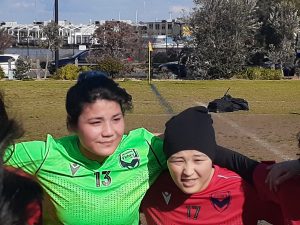Sport a tool to fight for human rights
Adiba Ganji says she represents the women of Afghanistan who have had their basic human rights taken away by the Taliban.
Speaking at the recent Refugee Communities Association of Australia (RCAA) conference in Melbourne, Adiba, a member of the Afghan women’s national football team, said that soccer had saved her life.
“Soccer was my passion and my dream and I still dream of becoming a professional,” she said.
“And soccer saved my life. Because I was a member of the team, I was able to leave Afghanistan. I have been in Australia for two years now without my family.
“It was hard at first. I spoke no English and I missed my family. So my story is one of hardship and resilience. But at least I am still following my dream.
“I am driven by the fact that I feel I represent Afghan girls who can’t follow their dreams.
“Every day we see in the news girls in Afghanistan can’t play sport, they can’t go to high school or university and the Taliban tells them what they can and can’t do,” Adiba said.
 She said that she also worried about her family who are living in limbo in Pakistan. Her father, who was a policeman prior to the Taliban’s takeover, is in hospital because he was injured by Taliban fighters during their seizure of power in 2021.
She said that she also worried about her family who are living in limbo in Pakistan. Her father, who was a policeman prior to the Taliban’s takeover, is in hospital because he was injured by Taliban fighters during their seizure of power in 2021.
Adiba said that sport could be powerful tool for advocating for the rights of women in Afghanistan and around the world.
“I never thought I would leave my home but here I am. I feel I have to do what I can to represent the girls and woman who don’t have voice,” she said.
The conference’s session on sport and refugees also heard that was also a powerful weapon in countering racism.
Western Bulldogs AFL club General Manager of Community and Government Relations Kashif Bouns told the conference the sports community had a role and a responsibility to counter racism.
“Recently, we’ve seen the Matildas as role models in this space, especially Sam Kerr and Mary Fowler who have diverse backgrounds,” Mr Bouns said.
“When people from multicultural communities succeed, they are Aussies but when it goes wrong they are Africans or Muslims.
“But fortunately, we have lots of people changing the narrative. People like Usman Kawaja, Peter Bol and Bashar Houli.
“They are breaking down barriers for their communities but also introducing mainstream Australians to multiculturalism,” Mr Bouns said.












